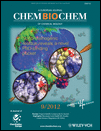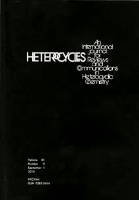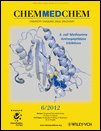
CURRENT OPINION IN CHEMICAL BIOLOGY
Scope & Guideline
Highlighting Breakthroughs in Chemical Biology
Introduction
Aims and Scopes
- Chemical Biology Techniques and Tools:
The journal extensively covers innovative methodologies in chemical biology, including chemical synthesis, bioconjugation, and imaging techniques that facilitate the understanding of complex biological systems. - Interdisciplinary Research:
It emphasizes research at the intersection of chemistry and biology, highlighting studies that integrate principles from both disciplines to address biological questions and challenges. - Therapeutic Applications:
There is a consistent focus on the development and application of chemical biology tools and strategies in therapeutic contexts, particularly in drug discovery, cancer treatment, and immunotherapy. - Metabolomics and Glycobiology:
CURRENT OPINION IN CHEMICAL BIOLOGY showcases significant research in metabolomics and glycobiology, exploring the roles of metabolites and glycans in biological processes and disease mechanisms. - Synthetic Biology Innovations:
The journal features advancements in synthetic biology, including the design of synthetic pathways, engineered organisms, and novel biomolecular systems, highlighting their potential in biotechnology and medicine.
Trending and Emerging
- Artificial Intelligence and Machine Learning in Chemical Biology:
There is a growing trend towards the application of AI and machine learning techniques for drug discovery, protein structure prediction, and analyzing complex biological data, highlighting the integration of computational tools in chemical biology. - Metabolomics and Functional Metabolite Research:
Research in metabolomics is expanding, with a focus on understanding metabolic pathways and their roles in health and disease, emphasizing the need for comprehensive metabolomic profiling. - Chemical Probes and Bioorthogonal Chemistry:
The use of chemical probes for studying biological processes and the development of bioorthogonal reactions are gaining traction, enabling scientists to investigate cellular dynamics in real-time. - Immunotherapy and Targeted Therapies:
There is an increasing emphasis on immunotherapeutic strategies and targeted therapies, with research focusing on the engineering of antibodies and small molecules to enhance treatment efficacy against various diseases. - Synthetic Biology Applications in Medicine:
Emerging research in synthetic biology is centered on developing engineered living systems and biomolecular tools for therapeutic applications, showcasing the potential of synthetic biology in addressing complex biological challenges.
Declining or Waning
- Traditional Drug Discovery Methods:
There is a noticeable decrease in publications focusing on conventional drug discovery techniques, as the field shifts towards more innovative and integrated approaches, such as personalized medicine and systems biology. - Basic Enzyme Mechanisms:
While foundational research in enzyme mechanisms remains important, the emphasis on purely mechanistic studies has diminished in favor of more application-oriented research that translates findings into therapeutic contexts. - Single-Target Approaches in Drug Development:
Research focusing solely on single-target drug development is declining as the field increasingly recognizes the complexity of biological systems and the need for multi-target or systems-level approaches.
Similar Journals

CHEMBIOCHEM
Pioneering insights in molecular biology and beyond.CHEMBIOCHEM is a premier interdisciplinary journal published by WILEY-V C H VERLAG GMBH, dedicated to advancing knowledge in the fields of Biochemistry, Molecular Biology, Molecular Medicine, and Organic Chemistry. With an impactful presence since its inception in 2000 and a convergence through to 2024, the journal has established itself as a vital resource for researchers, professionals, and students alike, evidenced by its notable quartile rankings in 2023—Q2 in Biochemistry, Molecular Biology, and Molecular Medicine, and Q1 in Organic Chemistry. While it does not currently offer Open Access options, CHEMBIOCHEM remains a respected platform for disseminating high-quality research, reflected in its Scopus rankings, where it holds a credible position in various chemistry categories. By fostering innovative studies and discussions, CHEMBIOCHEM aims to contribute to the understanding and advancement of biochemical and molecular principles critical to contemporary science and healthcare.

Moscow University Chemistry Bulletin
Igniting Passion for Chemistry, One Article at a TimeMoscow University Chemistry Bulletin is a distinguished academic journal dedicated to advancing the field of chemistry, published by PLEIADES PUBLISHING INC. With an ISSN of 0027-1314 and an E-ISSN of 1935-0260, this journal provides a platform for researchers, professionals, and students to explore a wide range of topics in general and specialized chemistry. While it holds a current Q4 ranking in the “Chemistry (miscellaneous)” category according to Scopus, the journal is committed to broadening its scope and visibility, aiming for greater impact in the global scientific community. Moscow University Chemistry Bulletin focuses on the publication of cutting-edge research, reviews, and discussions that stimulate innovation and collaboration. Although it is not an Open Access journal, it plays a crucial role in disseminating knowledge and fostering academic dialogue within the field, as it converges towards significant findings from 2004 to 2024. The continuous development of its content holds the potential to attract a diverse readership, making it a valuable resource for those involved in the chemical sciences.

JOURNAL OF ASIAN NATURAL PRODUCTS RESEARCH
Cultivating Insights in Complementary MedicineJOURNAL OF ASIAN NATURAL PRODUCTS RESEARCH is a prestigious publication in the field of natural products, focusing on valuable research spanning analytical chemistry, pharmacology, and complementary medicine. Published by Taylor & Francis Ltd in the United Kingdom, this journal has established itself as a key resource for academics and professionals seeking to explore advancements in drug discovery and organic chemistry. With a converged publication timeline from 1998 to 2024, the journal boasts several commendable category quartiles as of 2023, reflecting its robust standing in the research community: Q2 in Complementary and Alternative Medicine, Q3 in multiple domains including Analytical Chemistry and Organic Chemistry, and Q4 in Molecular Medicine. Although it currently does not offer open access, the journal remains a valuable compendium for empirical research and innovative studies in areas such as pharmacology and medicinal chemistry. Researchers, professionals, and students alike will find the JOURNAL OF ASIAN NATURAL PRODUCTS RESEARCH to be an essential platform for sharing groundbreaking findings and fostering collaborations that lead to significant advancements in science and health.

JOURNAL OF ENZYME INHIBITION AND MEDICINAL CHEMISTRY
Catalyzing Knowledge in Pharmacological SciencesJOURNAL OF ENZYME INHIBITION AND MEDICINAL CHEMISTRY, published by Taylor & Francis Ltd, is a premier open-access journal that has been at the forefront of research in the field of medicinal chemistry since its inception in 1985. With an ISSN of 1475-6366 and an E-ISSN of 1475-6374, this journal boasts a prestigious reputation reflected in its impressive Q1 rankings across critical categories such as Drug Discovery and Pharmacology as of 2023. Situated in the United Kingdom, it plays a vital role in disseminating high-quality research that addresses the burgeoning needs of drug discovery and enzyme inhibition methodologies. The journal supports full open access, providing a platform for researchers, professionals, and students to share significant findings and innovations widely. With a robust impact factor, the JOURNAL OF ENZYME INHIBITION AND MEDICINAL CHEMISTRY is indispensable for any academic or professional involved in the pharmacological sciences, offering an unparalleled insight into the latest advancements in therapeutic strategies and drug development.

Annual Review of Biochemistry
Connecting Past Discoveries with Future InnovationsAnnual Review of Biochemistry is a premier publication in the field of biochemistry, renowned for its comprehensive and critical reviews that collate significant advancements and insights since its inception in 1946. Published by Annual Reviews in the United States, this journal maintains a prestigious position within the academic community, boasting a Q1 ranking in the biochemistry category for 2023, with an impressive Scopus rank of #4 out of 438, placing it in the top 1% of its field. With a commitment to excellence, it serves as an essential resource for researchers, professionals, and students striving to stay at the forefront of biochemical research. While the journal does not operate on an open-access model, it continues to provide key insights and knowledge that fuel innovation and discovery in the life sciences. As it converges research from various eras up to 2024, Annual Review of Biochemistry remains a vital contributor to the development of molecular biology and genetics, catering to the needs of a diverse readership keen on advancing their understanding and expertise in biochemistry.

CHEMISTRY LETTERS
Shaping the future of chemistry, one letter at a time.Chemistry Letters, published by the Chemical Society of Japan, is a distinguished academic journal that focuses on pivotal developments in the field of chemistry. Since its inception in 1973, the journal has been a vital platform for the dissemination of novel research findings across various sub-disciplines, encompassing both theoretical advancements and practical applications. As a testament to its significance in the community, Chemistry Letters has achieved a Category Quartile of Q2 in the 2023 ranking for miscellaneous Chemistry journals, reflecting its respected position among peers. Although it does not offer Open Access, the journal remains accessible through institutional subscriptions, thus ensuring a wide reach for its valuable content. With an active scope ranging from general chemistry topics to specialized studies, it is ideal for researchers, professionals, and students alike who seek to contribute to and expand their knowledge within this dynamic field. The journal continuously aims to promote excellence in chemical research, facilitating dialogue and collaboration among chemists worldwide.

HETEROCYCLES
Bridging Gaps in Drug Discovery and DevelopmentHETEROCYCLES, published by the Japan Institute of Heterocyclic Chemistry, stands as a pivotal journal within the fields of Analytical Chemistry, Organic Chemistry, and Pharmacology. With its ISSN 0385-5414 and E-ISSN 1881-0942, HETEROCYCLES has been a respected platform for scholarly work since its establishment in 1983, featuring innovative research up until 2022. While currently not open access, the journal is renowned for its rigorous peer-review process, ensuring the dissemination of high-quality research. Despite its Q4 ranking in the 2023 quartiles for its categories, it plays a crucial role in bridging gaps in knowledge and advancing the discourse on heterocyclic compounds, which are vital in drug discovery and development. Researchers, professionals, and students who are engaged in chemistry and pharmacology will find HETEROCYCLES an essential source of cutting-edge studies, insights, and an opportunity to contribute to the evolving landscape of these scientific fields.

ChemMedChem
Exploring the nexus of chemistry and pharmacology.ChemMedChem is a leading international journal published by WILEY-V C H VERLAG GMBH in the United Kingdom, specializing in the interdisciplinary fields of medicinal chemistry and drug discovery. With a commendable impact factor that places it in the Q1 quartile for Organic Chemistry and among the Q2 ranks in several other key categories including Biochemistry, Molecular Medicine, and Pharmacology, ChemMedChem serves as a vital platform for the dissemination of innovative research and transformative insights in the development of pharmaceutical agents. Since its inception in 2006, this journal has been at the forefront of advancing knowledge that bridges the gap between fundamental research and practical applications in medicine, making it an essential resource for researchers, professionals, and students alike. Although it currently does not offer Open Access options, the journal ensures high-quality peer-reviewed content that engages its audience and fosters collaborative scientific discourse.

TETRAHEDRON LETTERS
Unveiling Breakthroughs in Organic Chemistry and BeyondTETRAHEDRON LETTERS, published by Pergamon-Elsevier Science Ltd, is a leading journal in the fields of Biochemistry, Drug Discovery, and Organic Chemistry, with a rich legacy since its inception in 1959. This prestigious journal serves as a vital resource for researchers and professionals dedicated to advancing the understanding of chemical sciences, featuring high-impact research that influences both academic and practical applications. Although it is currently classified in the third quartile across its categories for 2023, its rigorous peer-review process ensures the publication of quality research that contributes to the scientific community. With an ISSN of 0040-4039 and an E-ISSN of 1873-3581, TETRAHEDRON LETTERS is easily accessible for those in the academic landscape seeking to stay abreast of innovative developments. Researchers, professionals, and students alike will find invaluable insights and collaborative opportunities within the pages of TETRAHEDRON LETTERS, making it an essential read for anyone involved in the chemical sciences.

French-Ukrainian Journal of Chemistry
Exploring New Frontiers in ChemistryFrench-Ukrainian Journal of Chemistry, published by TARAS SHEVCHENKO NATIONAL UNIVERSITY OF KYIV, is an esteemed open-access journal that has been contributing to the field of chemistry since 2013. With the aim to foster collaboration and knowledge exchange between French and Ukrainian scholars, this journal provides a platform for innovative research, reviews, and discussions that advance the understanding of chemical sciences. Operating under the ISSN 2312-3222, it boasts a commitment to accessibility, ensuring that all published content is freely available to researchers, professionals, and students worldwide. This initiative enhances the visibility of critical findings and insights in a rapidly evolving scientific landscape. Aimed at promoting high-quality research, the journal invites submissions that encompass a wide range of chemistry-related topics, thereby supporting the growth of interdisciplinary approaches and international cooperation in the field.